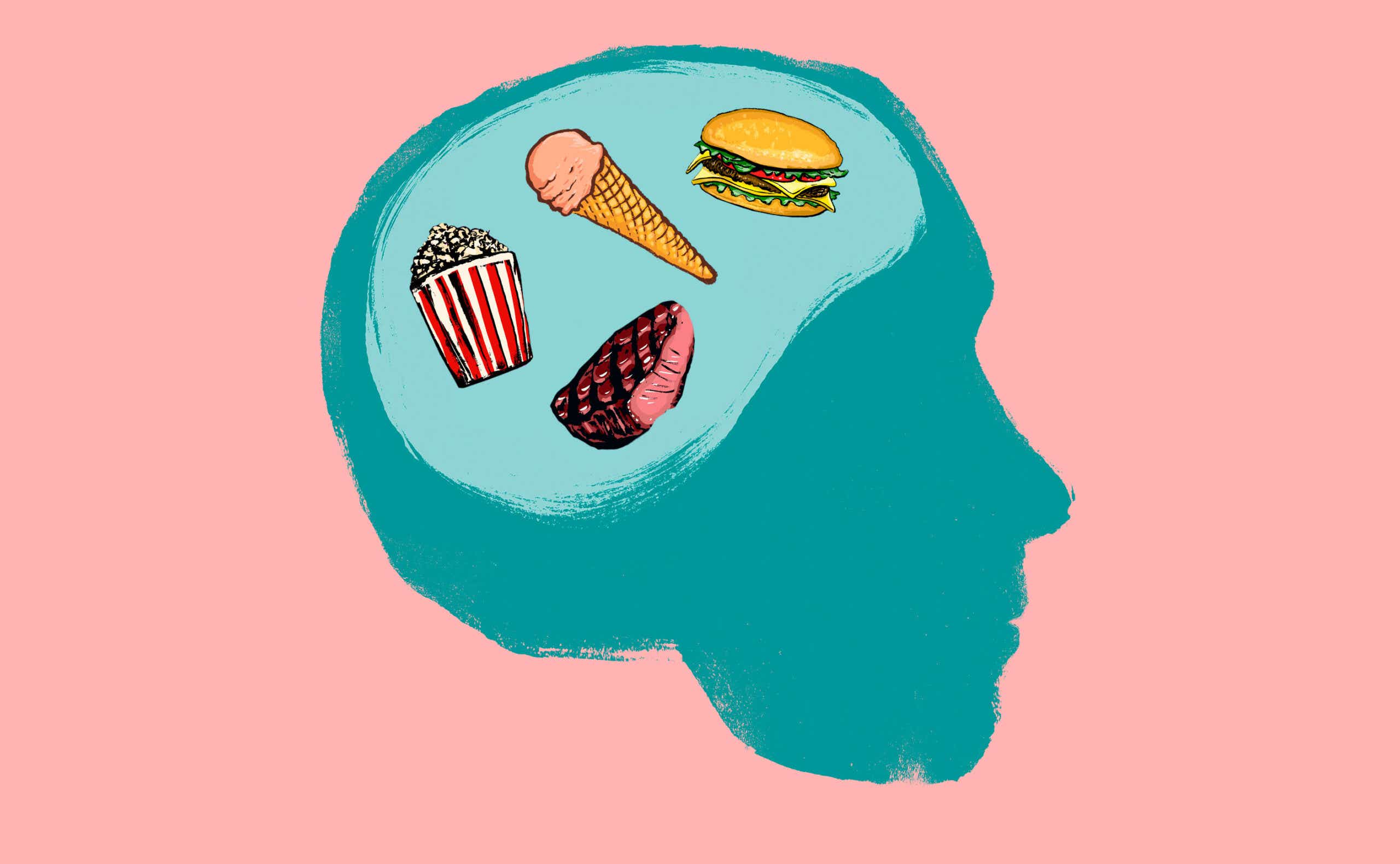Whether your loyalties lie with a bag of potato chips or a bar of chocolate, the fact is we all get cravings. More than 90 percent of people have experienced them at one point or another — often, of course, at the most inopportune times, like right before a long meeting or going to sleep.
If you’ve ever been woken up by a hankering for peanut butter and jelly or followed a fantasy toward a slice of pizza, you’ve probably wondered, why?! Basically, up until now, the popular belief was that the body drove these cravings, so if you were craving red meat, that was thought to be a sign of having low iron. But Kent Berridge, Ph.D., says the bulk of scientific evidence has now largely struck down this notion that dates back to the 1930s. As with most things, there are a few exceptions, such as sodium or calcium deficiencies. But our desires for certain foods are largely driven by our brains.
Still, some questions linger. What’s with the cravings that come right after we’ve eaten a meal? Well, cravings and hunger are two very different experiences.
“We can crave even when we’re full because the brain is still able to be tempted by palatable foods around us,” says Dr. Berridge, a professor of psychology and neuroscience at the University of Michigan.
The age-old question is: Should you ignore these cravings or give in to them? Dr. Berridge weighs in on this tricky topic and so much more.
The science behind food cravings
As it turns out, food cravings can be pretty complex because they can stem from various mental and physical factors. Oftentimes, food cravings can be triggered by your brain trying to fulfill an emotional need, such as reducing stress and anxiety. During these episodes, three regions of the brain — the hippocampus, insula, and caudate — are all activated almost as intensely as those parts of the brain would in someone with active drug addictions, according to a study published in NeuroImage. Specifically, memory parts of the brain like the hippocampus associate a specific food with a reward that drives these cravings.
Beyond physiological, lifestyle changes may play a role, too. For instance, chronic lack of sleep or quality rest suppresses a hormone known as leptin that regulates fat storage and calories burned while simultaneously triggering ghrelin, a hormone that causes hunger. Hydration is important, too: Not getting enough fluids, whether water or otherwise, can also exacerbate cravings, especially those on the sweeter side. That’s because when you’re not getting enough water it can be difficult for organs that use water, such as the liver, to release the food-storing substance known as glycogen or stored glucose, which is a type of sugar you get from the foods you eat. This, in turn, causes your body to crave sweets instead of water.
Why we crave certain foods
If you happen to gravitate toward a certain type of food time and time again, there’s a reason for that, according to Dr. Berridge. “We crave foods that we’re familiar with,” he says.
We’ve probably all had that chocolate craving and thought to ourselves, “why can’t I crave carrots?” It’s a fair point: Our cravings usually aim for sweet and fatty foods rather than fruits and vegetables. A part of it has to do with the fact that these greasier and sweeter foods are obviously tastier and more appetizing. And biology may be to blame there because, in the prehistoric era, our ancestors had to take advantage of these tasty treats where and when they could get them because they weren’t as readily available, Dr. Berridge says. That’s definitely not the case now — we can run to our nearest grocery store or order delivery from our favorite fast-food restaurant whenever we want.
Though this is not as common, some people also even crave non-food items like paper, dirt, or laundry detergent. Dr. Berridge says this tends to be a sign of pica, a condition driven by iron, calcium, or zinc deficiencies.
Should you fight cravings?
Counter to what you might think, you shouldn’t fight your cravings. The key to keeping them in check is to acknowledge them, rather than try to avoid them. “Trying to suppress hankerings often doesn’t work because suppressing means focusing on it, and when we focus on it, we’re more likely to give in,” Dr. Berridge tells us.
That said, it’s a good idea to come up with a plan for when you start itching for something to eat, especially since we tend to lean toward more fatty and sugary foods. Do you want to indulge, and will your craving be satiated if you do? Indulging in cravings is not wrong. However, we understand the concerns if you lean toward greasy or fatty foods and your cravings seem like bottomless pits. One option is to try to discover a more nutritious alternative to the specific thing you crave. If you crave the sugary fruit roll-ups of your youth, have you tried dried fruit as a substitute? Other techniques like mindfulness or starting a cravings journal can help you decide when to give into the urge and when to abstain and identify any potential triggers, like stress or anxiety. Studies have found that stress can drive up your cortisol hormones, which may be linked to hunger, cravings, and compulsive eating behaviors.
The bottom line
Various mental and physical factors cause food cravings. But the good news is that they’re rarely a sign that you’re lacking the nutrients found in that food. And getting them isn’t necessarily negative — after all, they’ve been key to our survival as humans. “We wouldn’t have evolved and succeeded in evolving if we didn’t have cravings,” Dr. Berridge tells us. “They’re what makes us seek food, mates, and the crucial things in life.”









